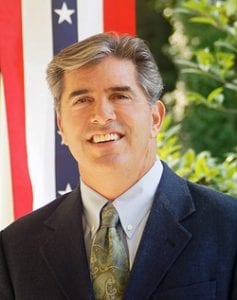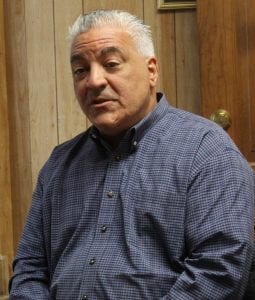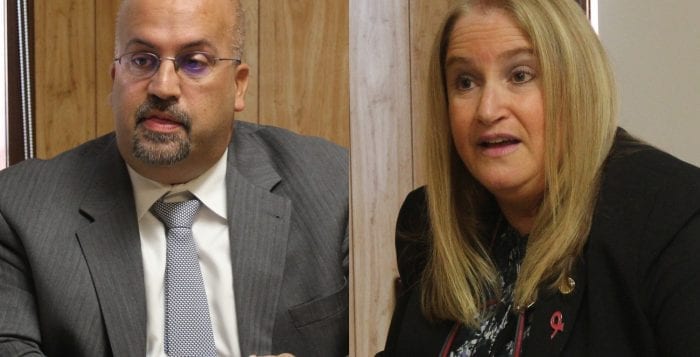The town of Huntington operates with a four-member council and a town supervisor. Currently, the supervisor is a Republican and two of the four council members are Democrats. Six names are on the ballot for Huntington’s town council, and voters can choose two candidates to serve a four-year term. The outcome of this election will determine majority party rule.
Two incumbents are running for reelection: Joan Cergol (D) and Eugene Cook (R). Cergol is cross-endorsed by the Green, Working Families and Independence parties. Cook is cross-endorsed by the Conservative, Libertarian and Independence parties. Challengers include Kathleen Cleary (D) and Andre Sorrentino (R), who is cross-endorsed by the Conservative and Working Families parties. Eleanor Putignano is running on the Green Party. Patrick Deegan is running as a Libertarian.
Putignano and Deegan, though they are listed on the ballot, were unable to be reached and did not attend the candidate debate hosted by TBR News Media. Deegan later agreed to a telephone interview.
In general, Huntington’s hot topics center on overdevelopment, water quality, parking and the high cost of living.
 Joan Cergol
Joan Cergol
Joan Cergol, after being elected in 2018 to serve a vacated one-year term seat, is running again this year for a full four-year term. A lifelong Huntington resident who has worked as a communications specialist, she is one of two Democrats on a four-member board. Cergol said that she considers herself an independent voice that works for all people in the Town of Huntington.
“If you want someone with a steady hand and head, a warm heart, a strong work ethic, all driven by an overarching desire, in all decisions made and votes cast, to simply do the right thing for Huntington, I’m your choice for town board,” Cergol states in her public profile online.
Cergol’s top concerns include budgetary policies related to appointed positions in town government and the lack of affordable housing.
“There’s no $1,500-a-month apartments anymore,” she said.
She said the town can save money for cash-strapped taxpayers if it exercised greater restraint and followed a different process for town employees. People in appointed positions should be qualified and paid fair wages rather than excessive salaries, she said. She favors zero-based budgeting, a system that audits every job position to justify its value and necessity. She also thinks the town can do a better job tapping into available grants to offset expenses, rather than hitting taxpayers up for different projects.
To address the housing concern, over the last year, Cergol successfully sponsored legislation that allows people, mainly the elderly, to rent out their own home, while living in their own smaller, accessory apartment on premises. The policy, she said, solves multiple housing-related issues, and she said it’s one of her proudest accomplishments during her first year as a legislator. Live-streaming and close-captioned viewing of town meetings were also her initiatives.
Overall, Cergol considers herself a problem solver of issues big and small and knowledgeable on the mechanisms of government. She said she prefers watching other people cross the finish line, rather than being in the spotlight herself.
The town, she said, is 95 percent built out. When considering redevelopment and revitalization projects, she said its important to evaluate the economic, social and environmental factors.

Eugene Cook
Eugene Cook has been elected to the town council for two consecutive terms and is running for a third and final term. He sponsored the new term-limit legislation and wants to be the first to leave after three consecutive terms.
Cook was raised on Long Island and lives in Greenlawn. He’s a welder by trade and owns a building contractor business.
The LIPA tax certiorari issue, he said, is the town’s greatest challenge and he is committed to pursuing all avenues to fight National Grid, who owns the Northport power plant. LIPA, he said, is out of control.
Other pressing issues for Cook include overdevelopment. He’d like to see the Village of Huntington designate more areas as historic to preserve its charm. The best way to enhance the community, he said, is through the arts. He is committed to supporting cultural projects that keep Huntington vibrant. Quality of life issues, he said, is and should be a main consideration when evaluating development projects. These approaches, he said, place Huntington on the map as a destination. He opposed the proposed Villadom Mall project in Elwood. The site, he said, is now under consideration for open space preservation.
To address ongoing need for additional parking, Cook sponsored legislation to purchase the old Chase Bank property at Gerard Avenue and Main Street, which will be leveled and converted to a 71-stall parking lot. The site is an asset, he said, that can always be sold if Uber and other shared drive services replace the demand for parking. Cook opposes the construction of what he called an unsightly, $30 million, multilevel parking garage, because the town may never need it and will likely mismanage the project.
Cook said he is proud of everything he does as a town council member. Helping veterans, he said, is particularly rewarding. He recently connected the Hispanic community with the police to enroll 250 kids in a new PAL soccer program. The experience, he said, was heartwarming. He also likes helping all mom and pop shops address building issues or whatever their concern may be.
“It’s my pleasure to serve the community,” he said.
 Kathleen Cleary
Kathleen Cleary
Kathleen Cleary is an East Northport resident with experience as a contract manager for Fortune 100 companies. Like Cergol, she said the town is bloated with patronage positions. Her experience overseeing projects to meet time and budget constraints, she said, will help bring transparency and ethical reform to Huntington. Her business administration degree, she said, will also help her streamline town operations through departmental and personnel efficiency assessments.
The lack of adequate parking in downtown Huntington is an ongoing problem. To address issues, Cleary’s ideas include implementing employee parking shuttles. She has no spot in mind, only a concept. Overdevelopment is also a top concern.
Cleary opposes settling the LIPA suit.
“You can’t just sit back and let them walk all over us,” she said.
She is impressed with community activism about the issue over the last few years. Because the Northport power plant is not an isolated case in one town, she said state government needs to offer remedies.
Overall, Cleary said her people skills, experience with government contracting and navigating bureaucracy makes her a good candidate for better efficiency and cost-cutting in town government.
Cleary also has a background in horticulture and is a Cornell certified master gardener. These skills, she said, provides insights into how to address water quality issues. She’s been involved with Long Island Native Plant Initiative, the Huntington League of Women Voters and Keep Islip Clean Project Bloom.
 Andre Sorrentino
Andre Sorrentino
Andre Sorrentino is also a lifelong Huntington resident and owner of PAS Professional Automotive Services. He promises to bring the small businessman perspective to town council. He loves Huntington and said he believes in getting things done. He’s proud to be a family man.
“I want to be the guy people go to,” Sorrentino said.
Sorrentino has insights into the town’s highway department, where he has been director of general services since February 2018. In that post, he’s helped to beautify parks. As an automotive inspector, he said that he sees firsthand that the poor state of the town’s highway equipment needs to be addressed.
Sorrentino said he feels a strong obligation to give back. He’s serving his fifth year as Huntington fire commissioner. He has gained a reputation in the community for his work handing out turkeys to families in need around Thanksgiving. Last year’s drive donated 2,660 turkeys.
As a tradesman, Sorrentino said that he would like to see the town promote apprenticeship programs, an idea that both Cergol and Cleary also see as important.

Patrick Deegan
Patrick Deegan is running a grassroots campaign with no money, no fundraising and just relying on support from neighbor to neighbor. He’s running on issues of water quality and soil contamination that can potentially cause a health crisis.
He said he’s worn four hats in life: semiprofessional distance runner, business man, a talent agent and for the last 17 years an unpaid advocate.
Deegan suffers from a connective tissue disorder that prevents him from physical labor but allows him research issues. Deegan said that he has been operating as a lobbyist, but since he’s not paid, he’s really an advocate.
He said he has researched topics and has worked behind the scenes to address issues such as opposing the Villadom development project and raising awareness statewide on fentanyl.
“This is what I’m doing with my free time now, “ said Deegan. “I want to help people.”
The job as town representative requires mental challenges.
If elected, Deegan will strive for more community-based leadership. He praises the work of civic organization and people who band together like the Fort Salonga Property Owners Association, which opposes the golf course development.
“If a tree falls down, we don’t need to wait three days for the town to come,” he said. “We can get it taken care of.”









 Joan Cergol
Joan Cergol
 Kathleen Cleary
Kathleen Cleary Andre Sorrentino
Andre Sorrentino











































